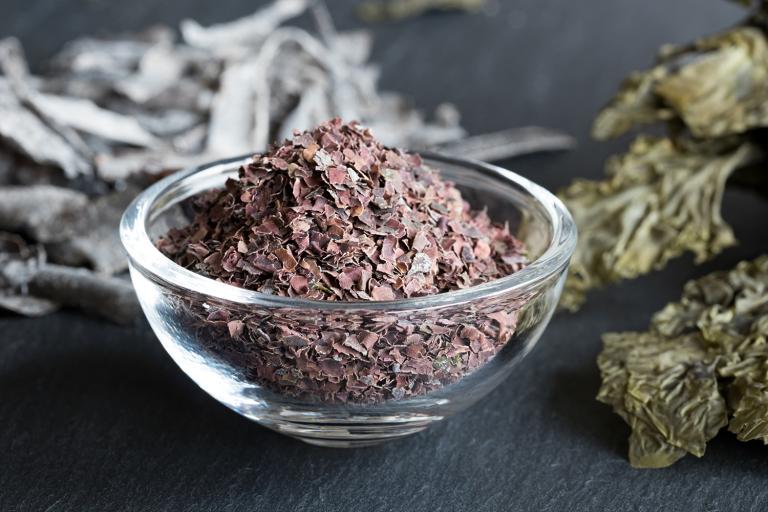The thyroid, a small, butterfly-shaped gland below your Adam’s apple, serves as the body’s thermostat for regulating metabolism. Sometimes the thyroid pumps out high or inadequate amounts of hormones; both scenarios are problematic.
In the case of an underactive thyroid, also called hypothyroidism, your body literally slows down. Because the thyroid doesn’t make enough thyroid hormones, everything from your pulse and temperature to the rate at which you burn calories starts to crawl. On the other hand, an overactive thyroid, called hyperthyroidism, sends the body’s systems into overdrive due to the overproduction of thyroid hormones.
Hypothyroidism is the far more common type of thyroid problem, with up to 20 million Americans affected, most of them women. Symptoms include fatigue, forgetfulness, depression, heavier periods, dry hair and skin, mood swings, weight gain, intolerance to cold, hoarse voice, and constipation.
Weighing In on Thyroid Health
The relationship between thyroid disease and obesity is widely misunderstood. “We used to think that thyroid problems caused obesity, but we now know that they don’t,” explains Catherine Shanahan, MD.
This is not to say that weight is off the hook. An unhealthy lifestyle can interfere with thyroid function. “Snacking or eating too often, eating toxic doses of sugar and refined, bleached, and deodorized oils, or other metabolism-disrupting compounds, lack of nutrients in the diet, and putting off sleep and exercise can send the delicate balance of the thyroid out of kilter,” says Dr. Shanahan. “I’ve seen many times that diet and lifestyle improvements alone can lead to the return of normal thyroid function.”
Hormone therapy might be unavoidable to treat severe thyroid imbalances; however, the following three key nutrients support a healthy thyroid gland.
Iodine
“Every one of my patients with thyroid disease has been iodine deficient,” notes Catherine Shanahan, MD, author of Deep Nutrition: Why Your Genes Need Natural Food.
She points out that this mineral is often a key part of thyroid health and recommends dulse seaweed as an incredibly iodine-rich food. “A single ounce is enough for the week. You can snack on it when you crave salt or snip it with culinary shears and sprinkle over a salad dressed with peanut or sesame oil, soy sauce, and balsamic vinegar,” she adds.
Other good sources of iodine include iodized salt, seafood such as tuna and shrimp, dairy products, and breads and cereals. If you eat a lot of food containing goitrogens, substances found in soy and cruciferous veggies such as cabbage, broccoli, cauliflower, and Brussels sprouts, this can interfere with the way your body uses iodine and supplementation may be useful.Those with unexplained fatigue or muscle pain, especially if there is cold intolerance, breast tenderness or cysts, weight gain, or constipation, might benefit from iodine supplements, says Jacob Teitelbaum, MD, author of Real Cause, Real Cure.
Be aware that too much iodine can aggravate the thyroid and worsen existing thyroid conditions so consult with a healthcare practitioner and consider getting tested for iodine deficiency before you supplement.
Selenium
This mineral plays a crucial role in the proper functioning of the thyroid gland, while research shows that too-low selenium intake increases the risk of thyroid disease. Historically, much of the selenium in American diets comes from animal-based foods, although another great source is Brazil nuts.
With another thyroid condition, Hashimoto’s disease, the body produces antibodies that interfere with the release of thyroid hormones. It can lead to symptoms such as anxiety, depression, dry skin, cold intolerance, puffy eyes, muscle cramps and fatigue, constipation, and slow thinking.
Hashimoto’s disease, like hypothyroidism, is treated with thyroid hormones. Supplementing with the mineral selenium—since it supports the body’s manufacture and use of thyroid hormones—can be beneficial for those with this thyroid problem. Work with a healthcare practitioner to get the green light on supplementation.
Research shows that those with celiac disease are often deficient in selenium.
Zinc
The mineral zinc plays a part in the production of thyroid hormones. Without enough zinc in your body, thyroid hormones are hard-pressed to do their job. Research shows when overweight women with hypothyroidism take zinc and selenium supplements, their thyroid health improves. If you supplement with a zinc product, make sure it’s properly balanced with copper to counteract zinc’s action of blocking copper absorption.

